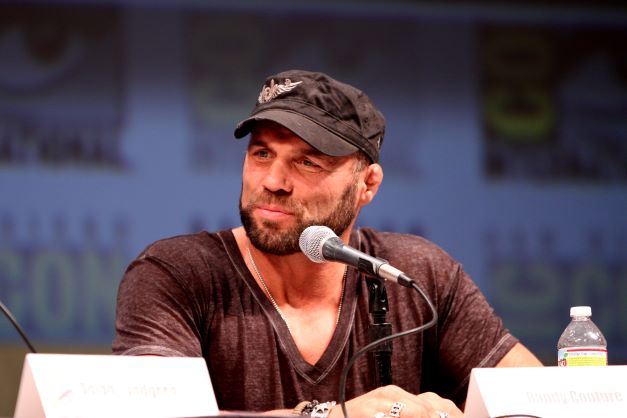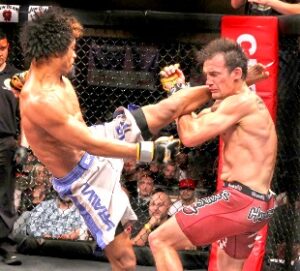
Are you wondering what age UFC fighters retire?
In this article, we’ll look at what age UFC fighters retire, why some UFC fighters retire later than others, what age UFC fighters should retire, the oldest UFC fighters of all time, and the oldest UFC champions of all time.
Contents
What Age Do UFC Fighters Retire?
On average UFC Fighters retire between 35 and 40. While professional MMA requires a minimum age of 18, there isn’t a maximum age limit and there are fighters who’ve fought up until the age of 47 in the UFC.
In MMA promotions outside of the UFC, fighters have fought into their 50s because the competition is lower and they were able to continue winning.
It’s not that the UFC sees age as an issue, it’s that fighters are usually released upon 3 consecutive losses and older fighters aren’t able to compete with the younger crop of athletes.
3 consecutive losses isn’t an exact rule but it’s a rule of thumb. Fighters have been released after just 2 losses and others up to 6, it’s entirely up to the UFC brass.
Between 35 to 40 is where UFC fighters start to struggle and lose multiple fights; ultimately leading to release rather than voluntary retirements. However, it’s still the age range in which most UFC fighters voluntarily retire too.
Why Do Some UFC Fighters Retire Older Than Others?
While the average age of retirement for a UFC fighter is between 35 and 40, a small number of fighters fight beyond 40 and some retire before 35.
Here are the reasons why a UFC fighter retires at an old age (above 40):
Money
The first and most obvious reason is because of money.
Excluding the 11 most well-paid UFC fighters, the average annual UFC salary in 2021 was $125,000, earned fighting 3 times per year on average.
Also, in 2021, 42% (256 fighters) of UFC fighters earned a 6-figure salary of $100,000 or more.
While there’s been a lot of controversy over UFC fighter pay in recent times, from the numbers above you can see they’re not poor, but for the best fighting athletes on the planet, you’d expect them to earn more.
After deducting their expenses and the fact they’re independent contractors and not eligible to receive a pension after retirement, they’re not left with a lot of money and it’s easy to see how the majority of UFC fighters need to keep fighting after the age of 35 and even 40 years old.
Most UFC fighters have been fighting professionally for nearly 100% of their adult life. Therefore they see no other way to make a 6-figure salary and continue down the career path they’ve known for so long.
Especially considering the difference between elite UFC fighters and middle-tier fighters is separated by the smallest of margins, while the difference in pay is gigantic. It makes sense for them to continue fighting where they can potentially triple or even 10x their earnings, or more if they string a lot of wins together.
They Love What They Do
Yes, it can be argued that UFC fighters are underpaid, but it’s not always about the money for many fighters.
The majority of athletes became fighters because they grew up practicing MMA from a young age or were having fights in school. They love to fight and there’s no bigger stage than the UFC when it comes to MMA.
Fighters who continue fighting past 40 years old have been fighting and training their whole lives and can’t see themselves doing any other work. At any time they have the opportunity to try their hand at another career if they feel fighting is no longer for them.
So, the athletes fighting between 35 to 40 and older, obviously love fighting on the world’s biggest stage. They enjoy the dopamine spikes, adrenaline rush, and entertaining millions of fans around the world, while at the same time growing their own fan base and helping others become UFC fighters.
Experience Matters
The average age of UFC champions is increasing and the current average age is 33. This means a lot of fighters aged 35 or older still have a chance of becoming a UFC champion and don’t want to retire until they’ve achieved their lifelong goal.
Most recently, Glover Teixeira became a UFC champion in 2021 at the age of 42, showing age is just a number.
Throughout UFC history there have been many UFC champions above the age of 35, and this is because the experience on the big stage counts for a lot in MMA. The reason there aren’t as many young UFC champions breaking through is that the older and more experienced fighters are in their way.
So, yes, most UFC fighters retire between 35 to 40, but the remaining fighters continuing in this age range and beyond are usually still great fighters who can compete with the top 25 fighters in a given weight class division.
They have to be great fighters to remain in the UFC as their usual policy is to release a fighter after 3 consecutive losses.
Nature of MMA
Unlike most other professional sports, UFC fighters can retire at an older age because they’re only fighting on average 2 or 3 times per year. This is on average, and older fighters can choose to fight once or twice per year if they please.
They can also choose to train less often and focus more on recovery and rest. They have years of fight experience and most aren’t looking to reinvent themselves as fighters. Taking care of themselves allows them to fight optimally than much younger fighters who are overtraining or over fighting.
The best way older fighters can do this is by doing less sparring as this is where a lot of MMA and UFC fighters injure themselves.
What Age Should UFC Fighters Retire?
Based on modern studies, the research tells us that MMA fighters are at risk of developing brain damage, and more specifically, CTE.
While more research is needed, it’s clear that in a sport where the aim is to hurt your opponent, the long-term health of UFC fighters’ brains is something to worry about.
The most relevant research in 2013 by the Lou Ruvo Center for Brain Health involving 104 boxers and 135 mixed martial artists, found no major difference in the brains of fighters with up to 5 years of fighting from nonfighting brains.
However, brain volume was found to be 10% lower in the caudate for fighters with careers lasting 15 years or more; an area of the brain concerning memory and learning.
Another study in 2019 by the same researchers looked at 100 MMA fighters, 50 boxers, and a nonfighting control group of 31. They found that current and retired fighters showed loss of brain volume in different areas of the brain, while the control group was gaining brain volume.
Current fighters’ losses were in the areas of the brain consistent with brain injury, while the retired fighters’ brain losses were in areas associated with neurodegenerative diseases such as CTE and Alzheimers.
The numbers given for the three groups were:
- Boxers lost an average of 145 cubic millimeters of brain volume annually
- Martial artists lost 100 cubic millimeters annually
- The nonfighting control group saw a gain of 43 cubic millimeters annually
These are just two studies in an area of research that only really started around 10 years ago.
Therefore, while it may be too soon to say, the research indicates that UFC fighters should retire before they’ve been fighting professionally for 15 years.
The average age a fighter turns professional in modern MMA is 21, meaning UFC fighters should retire at 36 or earlier if they care about protecting their brain.
However, it’s important to note that the above research may have been conducted on MMA fighters who fought in a period with less regulation and concern for their health and safety.
They would have fought more often without compulsory medical suspensions, not had the information about brain damage we have today regarding recovery, and fought at many unregulated MMA events which haven’t taken the necessary pre-medical exams and other important health and safety precautions.
Overall, as mentioned above, quitting isn’t that simple when a fighter needs money and fighting is all they’ve known for nearly 100% of their adult life.
17 Oldest UFC Fighters of All Time
Here’s a table showing the 17 oldest fighters in UFC history and how old they were when they last fought in the UFC. If a fighter is still active, the months won’t be displayed as they have a chance to get to the next age.
| Fighter | MMA Career Length | Oldest Age in UFC | Status |
| Randy Couture | 1997 – 2011 (24 Y) | 47 Years, 10 Months | Retired |
| Dan Henderson | 1997 – 2016 (19 Y) | 46 Years, 1 Month | Retired |
| Aleksei Oleinik | 1996 – (26 Y) | 45 | Active |
| Anderson Silva | 1997 – 2020 (23 Y) | 45 Years, 6 Months | Retired |
| Mark Coleman | 1996 – 2010 (24 Y) | 45 Years, 1 Month | Retired |
| Francisco Trinaldo | 2006 – (16 Y) | 44 | Active |
| Mark Hunt | 2004 – 2018 (14 Y) | 44 Years, 8 Months | Retired |
| Marion Reneau | 2010 – 2021 (11 Y) | 44 Years, 1 Month | Retired |
| Rogerio Nogueira | 2001-2020 (19 Y) | 44 Years, 1 Month | Retired |
| Andrei Arlovski | 1999 – (23 Y) | 43 | Active |
| Demian Maia | 2001 – 2021 (20 Y) | 43 Years, 7 Months | Inactive |
| Fabricio Werdum | 2002 – 2020 (18 Y) | 43 Years, 0 Months | Inactive |
| Glover Teixeira | 2002 – (20 Y) | 42 | Active |
| Yoel Romero | 2009 – (13 Y) | 42 Years, 10 Months | Inactive |
| Ken Shamrock | 1993 – 2016 (23 Y) | 42 Years, 8 Months | Retired |
| Dan Severn | 1994 – 2012 (18 Y) | 42 Years, 2 Months | Retired |
| Vitor Belfort | 1996 – 2018 (22 Y) | 41 Years, 1 Month | Retired |
Inactive = Fighters who are free agents or fighting for other MMA promotions, with a chance of coming back to the UFC.
Ron Van Clief could’ve been included in the table of oldest UFC fighters as he was 51 years old when he fought Royce Gracie at UFC 4. However, as he only had 1 UFC and MMA appearance, he can’t be considered a UFC fighter.
Keep in mind, these are the oldest UFC fighters of all time in the best MMA promotion in the history of the sport.
There have been older MMA fighters than those in the table, but they’re outside of the UFC as the competition is lower elsewhere. To be kept in the UFC you have to maintain a high-performance level.
However, they’re given leniency in a lot of cases where younger fighters would normally be released; mostly if they’ve had a lot of fights in the UFC and are chasing records.
For example, normally if a fighter loses 3 fights in a row they’re released by the UFC, but some of the oldest UFC fighters in the table above were kept on beyond 3 losses in a row.
- Marion Reneau lost her last 5 UFC fights before she retired
- Anderson Silva had 8 losses and 1 no contest in his last 9 fights
It’s easy to suggest that based on the oldest UFC fighters, fighters shouldn’t retire before 40 because they can still perform at the highest level.
However, the oldest UFC fighters are outliers and only time will tell if MMA and UFC fighters who fought after the age of 40 and for 15 years or longer have significantly impacted their long-term health.
12 Oldest UFC Champions of All Time
Here’s a table of the oldest UFC champions of all time, showing age is just a number and that fight experience counts for a lot.
The table has two columns, one for the age they were when they became the undisputed UFC champion, and the other for how old they were when they lost the title.
The fighters are in order from the oldest age they were when they lost the title to the youngest.
It’s also only undisputed UFC champions and not interim UFC champions.
| Fighter | Age When Champion | Held Title Until |
| Randy Couture | 43 Years, 8 Months | 45 Years, 4 Months |
| Glover Teixeira | 42 Years | 42 Years, 8 Months |
| Daniel Cormier | 39 Years, 3 Months | 40 Years, 4 Months |
| Fabricio Werdum | 37 Years, 10 Months | 38 Years, 9 Months |
| Jan Blachowicz | 37 Years, 7 Months | 38 Years, 8 Months |
| Michael Bisping | 37 Years, 3 Months | 38 Years, 8 Months |
| Stipe Miocic | 36 Years, 11 Months | 38 Years, 7 Months |
| Anderson Silva | 31 Years, 6 Months | 38 Years, 2 Months |
| Maurice Smith | 35 Years, 7 Months | 38 Years |
| Chuck Liddell | 35 Years, 3 Months | 37 Years, 5 Months |
| Georges St-Pierre | 36 Years, 5 Months | 36 Years, 6 Months |
| Murilo Bustamante | 35 Years, 5 Months | 36 Years, 2 Months |
As mentioned earlier, the average age of UFC champions is on the rise. At the time of writing (September 2022), Jiri Prochazka is the only current UFC champion under the age of 30 – but he turns 30 on October 14, 2022.
There are 12 UFC weight classes and currently 11 UFC champions because Amanda Nunes is a double champ. The average age of these 11 UFC champions is 33, a big difference from the youngest UFC champions of all time with an average age of 24.
Related Questions
1. What Do UFC Fighters Do After They Retire?
Some of the lucky UFC fighters continue working within the sport once they retire from fighting.
Some common roles are analysis, commentary, coaching, and management. Some fighters even attempt to start their own MMA promotion like Khabib Nurmagomedov has with his promotion, Eagle FC.
Former fighters, Daniel Cormier, Paul Felder, and Michael Bisping have gone on to have successful commentary positions with the UFC.
Many are also starting their own online business, mostly Youtube channels, and other social media channels. Michael Bisping and Chael Sonnen are both very successful on Youtube and talk about the UFC and MMA, and a lot of other fighters get into podcasting.
Another avenue retired UFC fighters go down is opening their own gym and coaching. Some of the most notable fighters to become successful coaches are Henry Cejudo, Mark Coleman, Randy Couture, and Pat Miletich.
Randy Couture cofounded Team Quest and founded Xtreme Couture, while Pat Miletich founded Miletich Fighting Systems. All three trained and guided many fighters to become UFC champions, such as Dan Henderson, Matt Hughes, Jens Pulver, Dave Menne, and Tim Sylvia, as well as many other successful UFC fighters.
Overall, on top of the above-mentioned jobs, retired UFC fighters have a lot of knowledge in the industry and can definitely find a role in the background of an MMA promotion or turn to teaching, nutrition, promoting, or consulting.
2. Why Do UFC Fighters Retire Early?
Some UFC fighters retire early mostly because they’ve made enough money or they have another career opportunity elsewhere. If a fighter can make a 6 figure salary another way, it’s possible that they’ll go down this route.
Other reasons may be that a fighter has fallen out of love with fighting, or their mentality towards it has become negative. With more information coming out about brain damage concerning MMA fighters, some fighters retire early because they feel it’s no longer worth it.
Lastly, some UFC fighters retire because they want to test the free agency market and end up joining other top MMA promotions that can afford to match or beat UFC contract offers such as Bellator, PFL, and One Championship.
3. Do UFC fighters keep their belts after retirement?
Yes, UFC fighters get to keep their belts after retirement, in both the classic and legacy belt systems.
In 2019, the UFC introduced the new legacy championship belts which changed the belts from the previously used classic belts.
With the classic belts, UFC champions received a new belt every time they won a title fight, and were able to keep every belt during their career and after retirement.
With the new legacy belts, UFC champions win and keep just one belt for each weight class division. Title fight wins are represented on the belts with red stones and each belt is specifically designed for each champion with their name, weight class, and nationality on the belt.
Once a fighter has won a UFC legacy belt, they keep it during their career and after they retire. The only time it’s given back to the UFC is when they’re updating the red stones on the belt to signify a changed number of title wins.
The Bottom Line
So, ‘what age do UFC fighters retire’?
The average age of retirement for UFC fighters is between 35 to 40 years old, but there are many UFC fighters who retire before 35 and many who fight past 40 – it’s a very subjective decision.
As can be seen from the table of the oldest UFC champions, the most common age to become a UFC champion is 37 years old, so based on this, UFC fighters shouldn’t retire until at least then.
Yes, they’re outliers, but it also shows what’s possible and how age is just a number. Plenty of the oldest UFC fighters of all time are still active and are putting together win streaks.
The average age of UFC champions has risen to 33 which is the highest it’s ever been. This is because experience is essential to success in MMA, meaning fighters may continue to push back their retirement date, and the average age UFC fighters retire at increases.
However, with long-term brain damage fears on the rise, it’s really a personal choice for each fighter.




